 W
WEdward Mikołaj Babiuch was a Polish Communist political figure. He was one of four deputy chairmen of the Polish Council of State 1976–1980. Babiuch served as the 50th Prime Minister of Poland from 18 February to 24 August 1980. He died in February 2021 at the age of 93. He was the longest-lived former Polish prime minister, improving on the record of Adam Jerzy Czartoryski.
 W
WZygmunt Henryk Berling was a Polish general and politician. He fought for the independence of Poland in the early 20th century. Berling was a co-founder and commander of the First Polish Army, which fought on the Eastern Front of World War II.
 W
WBolesław Bierut was a Polish politician, communist activist and leader of the Polish People's Republic from 1947 until his death in 1956. He was President of the State National Council from 1944 to 1947, President of Poland from 1947 to 1952, General Secretary of the Central Committee of the Polish United Workers' Party from 1948 to 1956 and temporarily Prime Minister of Poland from 1952 to 1954. Bierut, a self-taught man, with full knowledge and iron resolve aimed to implement the Stalinist system in Poland. Together with Władysław Gomułka, his main rival, Bierut is chiefly responsible for the historic changes that Poland underwent in the aftermath of World War II. Unlike any of his communist successors, Bierut ruled Poland until his death.
 W
WCzesław Bobrowski was a Polish economist. In postwar Poland, he was a director of Central Planning Office from 1945–1948, author of the Three-Year Plan. He was also a member of the State National Council (1945–1947) and Parliament (1947–1948).
 W
WWładysław Kazimierz Broniewski was a Polish poet, writer, translator and soldier. Known for his revolutionary and patriotic writings.
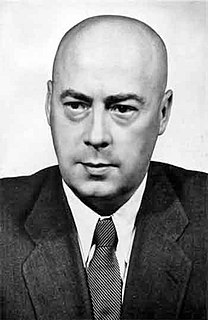 W
WJózef Adam Zygmunt Cyrankiewicz was a Polish Socialist (PPS) and after 1948 Communist politician. He served as premier of the Polish People's Republic between 1947 and 1952, and again for 16 years between 1954 and 1970. He also served as Chairman of the Polish Council of State from 1970 to 1972.
 W
WJan Dobraczyński was a Polish writer, novelist, politician and Catholic publicist. In the Second Polish Republic between the two world wars, he was a supporter of the National Party and Catholic movements. During the 1939 Nazi–Soviet invasion of Poland, he was a soldier of the Polish Army and member of Armia Krajowa until the end of World War II. Dobraczyński participated in the Warsaw Uprising of 1944. After the war he supported the Polish communists. He was a member of parliament Sejms, as activist of the PAX Association and of the Patriotic Movement for National Rebirth from 1982 to 1985. He held the rank of general in the Polish military.
 W
WXawery Dunikowski was a Polish sculptor and artist, notable for surviving Auschwitz concentration camp, and best known for his Neo-Romantic sculptures and Auschwitz-inspired art.
 W
WArkady Fiedler was a Polish writer, journalist and adventurer.
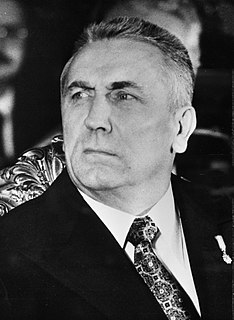 W
WEdward Gierek was a Polish communist politician and de facto leader of Poland between 1970 and 1980. Gierek replaced Władysław Gomułka as First Secretary of the ruling Polish United Workers' Party (PZPR) in the Polish People's Republic in 1970. He is known for opening communist Poland to the Western Bloc and for his economic policies based on foreign loans, which ultimately failed. He was removed from power after labour strikes led to the Gdańsk Agreement between the communist state and workers of the emerging Solidarity free trade union movement.
 W
WWładysław Gomułka was a Polish communist politician. He was the de facto leader of post-war Poland from 1947 until 1948. Following the Polish October he became leader again from 1956 to 1970. Gomułka was initially very popular for his reforms; his seeking a "Polish way to socialism"; and giving rise to the period known as "Gomułka's thaw". During the 1960s, however, he became more rigid and authoritarian—afraid of destabilizing the system, he was not inclined to introduce or permit changes. In the 1960s he supported the persecution of the Catholic Church, intellectuals and the anti-communist opposition.
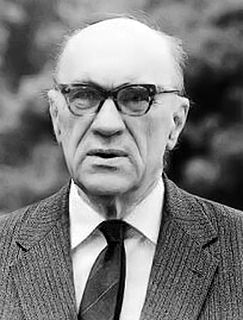 W
WJarosław Leon Iwaszkiewicz, also known under his literary pseudonym Eleuter, was a Polish writer, poet, essayist, dramatist and translator. He is recognized for his literary achievements, beginning with poetry and prose written after World War I. After 1989, he was often presented as a political opportunist during his mature years lived in communist Poland, where he held high offices. He was nominated for the Nobel Prize in Literature four times. In 1988, he was recognized as a Righteous Among the Nations for his role in sheltering Jews during World War II.
 W
WHenryk Jan Jabłoński was a Polish Socialist. After 1948, he became a Communist politician, as well as a historian and professor at Warsaw University. He served as head of state of the People's Republic of Poland between 1972 and 1985.
 W
WMieczysław Zygmunt Jagielski was a Polish politician and economist. During the times of the People's Republic of Poland he was the last leading politician from the former eastern regions of pre-Second World War Poland.
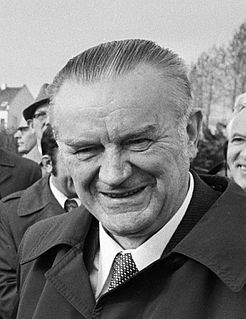 W
WGen. Piotr Jaroszewicz was a post World War II Polish political figure. He served as the Prime Minister of Poland between 1970 and 1980. After he was forced out of office he lived quietly in a suburb of Warsaw until his brutal 1992 murder.
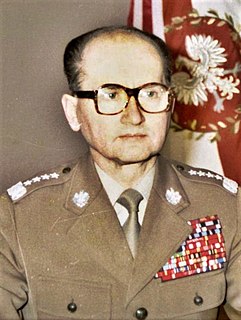 W
WWojciech Witold Jaruzelski was a Polish military officer, politician and de facto dictator of the Polish People's Republic from 1981 until 1989. He was the First Secretary of the Polish United Workers' Party between 1981 and 1989, making him the last leader of the Polish People's Republic. Jaruzelski served as Prime Minister from 1981 to 1985, the Chairman of the Council of State from 1985 to 1989 and briefly as President of Poland from 1989 to 1990, when the office of President was restored after 37 years. He was also the last commander-in-chief of the Polish People's Army, which in 1990 became the Polish Armed Forces.
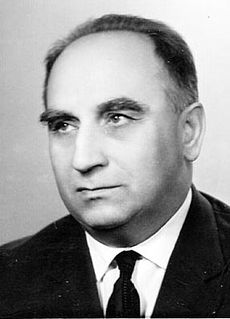 W
WStefan Jędrychowski was a Polish communist politician, economist and journalist, who served as deputy prime minister, foreign minister and finance minister in Poland.
 W
WFranciszek Jóźwiak was a Polish communist politician, military commander, chief of staff of the People's Guard, the People's Army and the Citizen's Militia as well as deputy chairman of the Council of Ministers of the People's Republic of Poland and a long time member of the Politburo of the Polish United Workers' Party.
 W
WStanisław Kania was a Polish communist politician.
 W
WZenon Kliszko, was a politician in the Polish People's Republic, considered the right-hand man of Polish United Workers' Party (PZPR) leader Władysław Gomułka.
 W
WVladislav Vikentyevich Korchits was a Soviet and Polish general. He supported the Bolshevik side during the Russian Revolution, joining the Red Army. He participated in the Polish-Soviet War. In the interwar period he graduated from the Mikhail Frunze Military Academy. He was imprisoned and tortured during the Great Purge, survived it and was reinstated afterward. He took part in World War II. From 1944 he was attached to the Polish Armed Forces in the East. After the war he remained in the People's Republic of Poland. He served in the Polish People's Army as the chief of Polish General Staff from 1 January 1945 to 18 January 1954. While in Poland, he joined the Polish Workers' Party, was the Deputy Minister of National Defense (1949/1950-?), and the deputy to the Polish parliament (Sejm) for the term 1952-1956. In 1954 he retired and returned to the Soviet Union. He died in Moscow.
 W
WTadeusz Marian Kotarbiński was a Polish philosopher, logician and ethicist.
 W
WLeon Kruczkowski was a Polish writer, publicist and public figure. He wrote books and dramas and was prominent in Polish theatre of the post-World War II period. His best known work is the drama Niemcy, written in 1949.
 W
WStanisław Leon Kulczyński was a Polish botanist and politician.
 W
WOskar Ryszard Lange was a Polish economist and diplomat. He is best known for advocating the use of market pricing tools in socialist systems and providing a model of market socialism. He responded to the economic calculation problem proposed by Ludwig von Mises and Friedrich Hayek by claiming that managers in a centrally-planned economy would be able to monitor supply and demand through increases and declines in inventories of goods, and advocated the nationalization of major industries. During his stay in the United States, Lange was an academic teacher and researcher in mathematical economics. Later in socialist Poland, he was a member of the Central Committee of the Polish United Workers' Party.
 W
WIgnacy Loga-Sowiński was a Polish trade union activist and politician. He was a member of the Central Committee and Politburo of the Polish United Workers' Party. He was a member of the State National Council from 1956 to 1971. He also served as the deputy chairman of the council and was an ambassador of the Polish People's Republic to Turkey from 1971 to 1978.
 W
WWitold Roman Lutosławski was a Polish composer and conductor. Among the major composers of the 20th century, he is "generally regarded as the most significant Polish composer since Szymanowski, and possibly the greatest Polish composer since Chopin". His compositions—of which he was a notable conductor—include representatives of most traditional genres, aside from opera: symphonies, various orchestral works, chamber works, concertos, and song cycles, some of which he orchestrated. Of these, his best known works are his four symphonies, the Variations on a Theme by Paganini (1941), the Concerto for Orchestra (1954), and a cello concerto (1970).
 W
WMieczysław Moczar was a Polish communist politician who played a prominent role in the history of the Polish People's Republic. He is most known for his unorthodox, alternative socialist views attitude which influenced Polish United Workers' Party politics in the late 1960s. During this time, Moczar and his supporters challenged Władysław Gomułka's authority.
 W
WZygmunt Modzelewski was a Polish communist politician, professor, economist and diplomat.
 W
WEdward Ochab was a Polish communist politician and top leader of Poland between March and October 1956.
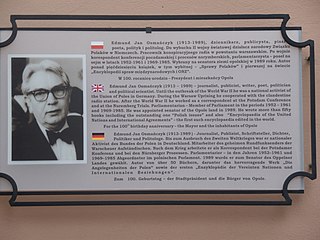 W
WEdmund Jan Osmańczyk, Polish writer, author of Encyclopedia of the United Nations and International Agreements.
 W
WWincenty Pstrowski was a Polish miner, known as the Polish Stakhanov and recognized with awards for his high productivity, during the Three Year Plan.
 W
WAdam Rapacki was a leading Polish Communist politician and diplomat from 1947 to 1968. He started in the socialist movement but in 1948 joined the Central Committee of the new Polish United Workers' Party (PZPR), and became a member of its Politburo. It had very close ties to the Kremlin. He is best known for his 1957 proposal for the creation of nuclear-free zones in Europe; it was never adopted. He maintained good relations with East Germany while warning against West German expansionism. Piotr Wandycz finds that he was well educated, cosmopolitan, pragmatic, liberal and ambitious, and imbued with a sense of patriotism and belief in cooperation with the left in Western Europe.
 W
WKonstantin Konstantinovich (Xaverevich) Rokossovsky was a Soviet and Polish officer who became Marshal of the Soviet Union, Marshal of Poland, and served as Poland's Defence Minister from 1949 until his removal in 1956 during the Polish October. He was among the most prominent Red Army commanders of World War II.
 W
WMichał Rola-Żymierski was a Polish high-ranking Communist Party leader, communist military commander and NKVD secret agent. He was appointed as Marshal of Poland by Joseph Stalin, and served in this position from 1945 until his death. He supported the 1981 imposition of Martial law in Poland.
 W
WFlorian Siwicki was a Polish military officer, diplomat and communist politician. He was a general in the Polish Army and Minister of Defense of Poland from 1983 to 1990.
 W
WWłodzimierz Sokorski was a Polish communist official, writer, military journalist and a Brigadier General in the People's Republic of Poland. He was the Minister of Culture and Art responsible for the implementation of the socialist realist doctrine in Poland. During World War II he escaped to the Soviet Union.
 W
WLudwik Solski, born Ludwik Napoleon Karol Sosnowski, was a Polish stage actor and theatre director. From his stage debut in 1876 until his death he played in nearly a thousand roles. He was married to the Polish actress and director Irena Solska nee Poświk.
 W
WMarian "Marek" Spychalski was a Polish architect in pre-war Poland, and later, military commander and a politician. During World War II he belonged to the Polish underground forces operating within Poland and was one of the leaders of the resistance movement Gwardia Ludowa, then Armia Ludowa.
 W
WKarol Wacław Świerczewski was a Polish and Soviet Red Army general and statesman. He was a Bolshevik Party member during the Russian Civil War and a Soviet officer in the wars fought abroad by the Soviet Union including the one against Polish as well as Ukrainian Republics and in Republican Spain. In 1939 he participated in the Soviet invasion of Poland again. At the end of World War II in Europe he was installed as one of leaders of the Soviet-sponsored Polish Provisional Government of National Unity. Soon later, Świerczewski died in a country-road ambush shot by the militants from OUN-UPA. He was an icon of communist propaganda for the following several decades.
 W
WAndrzej Witold Wajda was a Polish film and theatre director. Recipient of an Honorary Oscar, the Palme d'Or, as well as Honorary Golden Lion and Honorary Golden Bear Awards, he was a prominent member of the "Polish Film School". He was known especially for his trilogy of war films consisting of A Generation (1955), Kanał (1957) and Ashes and Diamonds (1958).
 W
WCzesław Wycech (1899–1977) was a Polish activist, politician and historian. He was a member of the Polish peasant's parties: the Polish People's Party "Wyzwolenie", the People's Party, the Polish People's Party, and the United People's Party. During World War II he was a member of the Polish Underground State, responsible for organizing underground education. He was the Minister of Education in the Council of National Unity (1945–1947). Within the People's Republic of Poland, he was a member of the Polish parliament (Sejm) and also held other governmental posts.
 W
WAleksander Zawadzki, alias Kazik, Wacek, Bronek, One was a Polish communist politician, first Chairman of the Council of State of the People's Republic of Poland, divisional general of the Polish Army and the head of the Council of State of the Polish People's Republic from 1952 to 1964.
 W
WWojciech Żukrowski was a Polish prosaist, poet, reporter, essayist and literary critic.